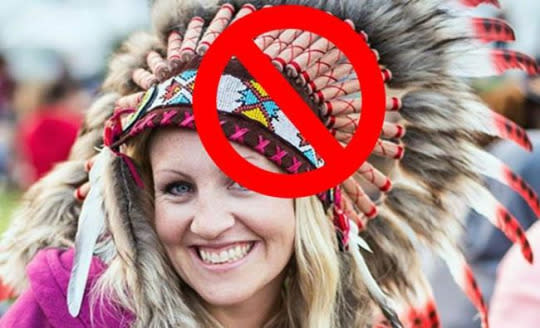 Daily Brew
Daily BrewWhy music festivals are banning First Nations headdresses

The trend of wearing native-style headdresses as fashion accessories at music festivals appears to be coming to an end as organizers rush to ban the ceremonial items.
Feather headdresses have become hugely popular in recent years at music festivals around the world, especially Coachella in Southern California.
But they’re quickly falling out of fashion amongst festival organizers who have faced widespread backlash for permitting the cultural appropriation of First Nations symbols.
Three Quebec festivals — Osheaga, Heavy Montréal and ÎleSoniq — banned them this week.
This follows similar moves last year by the Bass Coast festival in Merritt, B.C., the Tall Tree Festival on Vancouver Island and the Glastonbury Festival in the United Kingdom.
"First Nations Headdresses have a spiritual and cultural meaning in the native communities and to respect and honour their people, Osheaga asks fans and artists attending the festival to not use this symbol as a fashion accessory,” reads a post on the festival's Facebook page on Monday.
Believed to have originated with the Sioux Indians and other tribes in the Great Plains regions, the feather headdresses, or war bonnets, are worn only by chiefs and warriors, with each feather indicating an act of bravery or heroism, according to the American Indian Heritage Foundation.
In An Open Letter to Non-Natives in Headdresses, Montreal Métis blogger Chelsea Vowel compares wearing a headdress for fun to sporting a war medal you didn't earn or faking a university degree.
In an Interview with CBC Music, Ian Campeau of the aboriginal electronic music trio A Tribe Called Red described the trend as "redface."
The Winnipeg Folk Festival found itself embroiled in controversy last week when a woman was photographed at the show sporting a feather headdress and face paint. It has since vowed to ban the items in the future.
The Edmonton Folk Festival quickly followed suit, even though it’s never had a problem with people sporting the garment.
“We wanted to get well ahead of this,” festival producer Terry Wickham told the Edmonton Journal. “It’s an obvious case of common sense and respect."
The Calgary Folk Festival, however, refuses to enact a ban, saying there’s no need to a fix a problem that doesn’t yet exist.
Executive director Debbi Salmonsen told CBC nobody has sported headdresses at the festival before, and she doesn’t expect them to start.
"First Nations artists do not consider it respectful when people wear headdresses, which they are not culturally entitled to wear, so we would hope in respect for both our aboriginal audience members and artists that people will respect that,” she said.
Public relations expert Stephen Murdoch, vice-president of Enterprise Canada, says the banning something deeply offensive for First Nations people is a smart move for festivals organizers. He urged them to stick to their guns.
“For concert promoters, it’s a no-brainer to ban First Nation headdresses,” Murdoch told Yahoo Canada News.
“From a public relations standpoint, festival promoters need to remain committed to their beliefs. If you have a policy in place banning First Nations headdresses, stick to the policy. The biggest issue for concert promoters will be communicating the ban to concert attendees."


